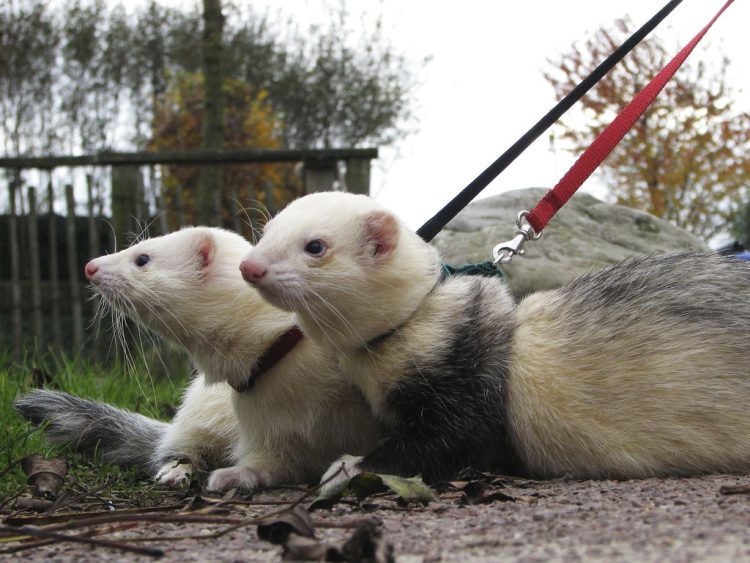Ferret Kinda Acts Funny With Jaw When She Eats

Ferrets aren't just cute and funny balls of fluff. They are adventurous, sneaky and extremely curious.
Before you close the fridge door or washing machine lid, check for your ferret — I'm not kidding. Ferrets can, and will, get into some strange places.
And don't forget about chewing. Ferrets can ingest dangerous things, so keep your veterinarian's number handy and be on the lookout for the following ferret health warning signs.
1. Lethargy or Collapsing
These symptoms could be a sign of thinning or thickening of the walls of the heart (cardiomyopathy). Additional potential symptoms include excessive coughing, fluid buildup, difficulty waking up or having to rest when walking across a room.
2. Shaking Violently or Screaming
These episodes may be seizures. Older ferrets are prone to cancer that reduces blood sugar levels, which can cause seizures. A disease similar to feline infectious peritonitis (FIP) can also cause seizures.
3. Trouble Urinating
You may notice your ferret is not urinating, or the litter box remains clean too long. Perhaps your ferret makes a loud squeak when in the litter box. Causes include an enlarged prostate compressing the urethra until urine can no longer pass through it (for males), bladder stones or severe bladder infections.
4. Abdominal Pain and Whimpering
If your ferret starts whimpering or is in obvious discomfort when you touch the abdominal area, a foreign or toxic object may have been ingested. Other signs include jaundice, lethargy or vomiting.
5. Loss of Appetite
When a ferret stops eating the same amount of food or stops eating entirely, vet care is needed. Possible causes include stomach ulcers, foreign body ingestion, hairballs, disease, kidney failure, liver failure or cancer.
Watch this video to learn more about these pets:
http://youtu.be/xCZwiEEvEsM
6. Trouble Breathing
Any type of breathing difficulty or labored breathing should get immediate attention. Possible causes include cancer, heart disease, infections or infectious diseases, or a recent trauma.
7. Color Changes
Changes to the color of a ferret's gums, lips or nose can be a sign of anemia, a serious condition. Color changes from anemia turn these areas pale or white. Yellowing (jaundice) can be a sign of liver damage or disease. The urine can also change color. The typical yellow urine can turn green because of heartworms, anemia or a bladder infection.
8. Problems After Surgery
Ferrets may have problems after surgeries, such as chewing out their stitches, running a fever or even going into shock. A warm ferret could be a sign of fever. Alternatively, a cold ferret may be going into shock. Ask your vet for advice after surgery because not all emergency clinics will treat ferrets.
9. Excessive Scratching
Scratching can be a sign of fleas and ticks. Follow your vet's recommendation for flea treatment, being careful to check the dosage and type of medication (using meds designed for other species can be fatal to ferrets). Ticks can also spread Lyme disease, so remove ticks and make sure no parts of the tick are left in your ferret.
Excessive scratching at the ears is a possible sign of ear mites. This is usually accompanied by black or orange discharge or a smelly odor. Clean the ears and contact your vet for treatment.

10. Lumps Near the Rear
If you notice lumps near the anal area or your ferret is scooting his booty across the floor, the anal glands may need to be expressed or even removed.
11. Swollen Vulva
Female ferrets (called jills) who are not spayed can suffer from a swollen vulva, lethargy, weakness, loss of hair or appetite. This potentially life-threatening problem is caused by an excess of estrogen during the heat cycle that prevents red and white blood cells from being produced.
12. Limping or Walking Abnormally
Ferrets are injured easily, whether it's from chewing on wires or hiding under a recliner. Even getting a foot stuck in a ramp within their cage can cause torn ligaments. If you notice your ferret is limping or walking differently, get him to the vet.
13. Heavy Panting
This can be a sign of serious heat stroke. Ferrets cannot sweat, so watch them when temperatures are above 80 degrees Fahrenheit. If the ferret is still conscious, encourage him to drink water. Unconscious ferrets should be placed in cool water (not cold) or wrapped in cool water-soaked towels. If you don't see any improvement in under 10 minutes, get to the vet right away.
14. Eye Crustiness or Rashes
These 2 symptoms can be a sign of distemper. Additional symptoms may include hardened paw pads, diarrhea, vomiting, lethargy or seizures. Unfortunately, ferrets easily contract distemper and there is no treatment. A vaccine can keep your ferret from contracting distemper.
15. Loss of Muscle or Skin Tone
Cancer has many symptoms, such as the loss of muscle or skin tone, hair loss, poor coat quality, flaky and itchy skin, red patches, abdominal fat deposits and a strong, musky odor. Regular vet checkups are important to catch illnesses like this as early as possible.
You should also be on the lookout for hair loss and baldness — signs of Cushing's disease, which is common in neutered ferrets.

This pet health content was reviewed for accuracy by a veterinarian, Dr. Pippa Elliott, BVMS, MRCVS. It was last reviewed and updated Oct. 11, 2018.
Source: https://www.petful.com/pet-health/15-ferret-health-warning-signs/
0 Response to "Ferret Kinda Acts Funny With Jaw When She Eats"
Post a Comment